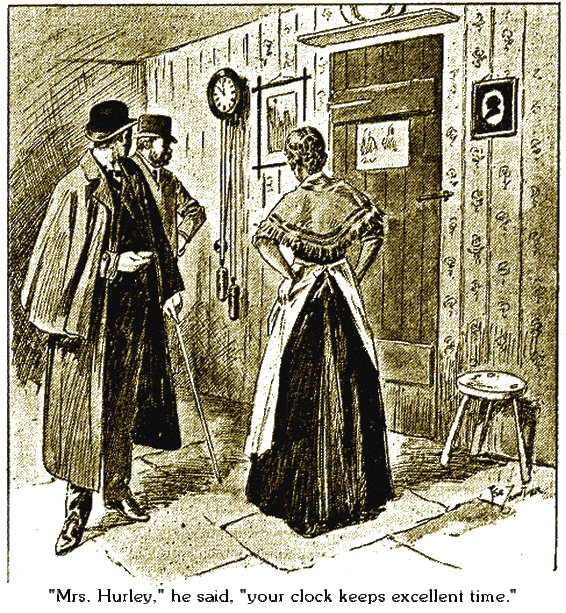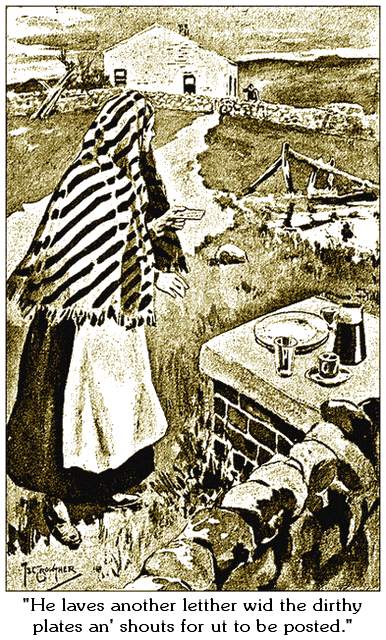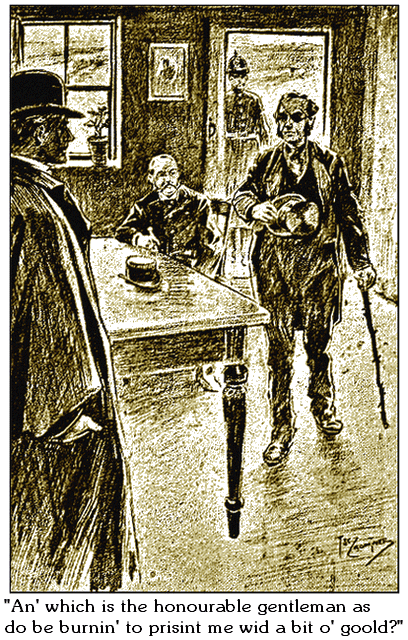Adventures of Martin Hewitt (21 page)

“I suppose, Mrs. Hurley,” Hewitt said, “you’ve seen as much of the life of
those two gentlemen here as anybody?”
“True ut is, sor; none more—nor as much.”
“Did you ever hear of anybody being on bad terms with Mr.
Rewse—anybody at all, Mr. Main or another?”
“Niver a soul in all Mayo. How could ye? Such a foine young jintleman, an’
fair-spoken an’ all.”
“Tell me all that happened on the day that you heard that Mr. Rewse was
ill—Tuesday week.”
“In the mornin’, sor, ‘twas much as ord’nary. I was over there at half
afther sivin, an’ ‘twas half an hour afther that I cud hear the jintleman
dhressin’. They tuk their breakfast—though Mr. Rewse’s was a small wan.
It was half afther nine that Mr. Main wint off walkin’ to Cullanin, Mr. Rewse
stayin’ in, havin’ letthers to write. Half an hour later I came away mesilf.
Later than that (it was nigh elivin) I wint across for a pail from the yard,
an’ then, through the windy as I passed I saw the dear young jintleman
sittin’ writin’ at the table calm an’ peaceful—an’ saw him no more in
this warrl’.”
“And after that?”
“Afther that, sor, I came back wid the pail, an’ saw nor heard no more
till two o’clock, whin Mr. Main came back from Cullanin.”
“Did you see him as he came back?”
“That I did, sor, as I stud there nailin’ the fence where the pig bruk ut.
I’d been there an’ had me of down the road lookin’ for him an hour past,
expectin’ he might be bringin’ somethin’ for me to cook for their dinner. An’
more by token he gave me the toime from his watch, set by the Town Hall
clock.”
“And was it two o’clock?”
“It was that to the sthroke, an’ me own ould clock was right too whin I
wint to set ut. An’—”
“One moment; may I see your clock?”
Mrs. Hurley turned and shut an open door which had concealed an old
hanging clock. Hewitt produced his watch and compared the time. “Still right
I see, Mrs. Hurley,” he said; “your clock, keeps excellent time.”

“It does that, sor, an’ nivir more than claned twice by Rafferty since me
own father (rest his soul!) lift ut here. ‘Tis no bad clock, as Mr. Rewse
himsilf said oft an’ again; an’ I always kape ut by the Town Hall toime. But
as I was sayin’, Mr. Main came back an’ gave me the toime; thin he wint
sthraight to his house, an’ no more av him I saw till may be half afther
three.”
“And then?”
“An’ thin, sor, he came across in a sad Lakin’, wid a letther. ‘Take ut,’
sez he, ‘an’ have ut posted at Cullanin by the first that can get there. Mr.
Rewse has the sickness on him awful bad,’ he sez, ‘an’ ye must not be near
the place or ye’ll take ut. I have him to bed, an’ his clothes I shall burn
behin’ the cottage,’ sez he, ‘so if ye see smoke ye’ll know what ut is.
There’ll be no docthor wanted. I’m wan mesilf, an’ I’ll do all for ‘um. An’
sure I knew him for a docthor ivir since he come. ‘The cottage ye shall not
come near,’ he sez, ‘till ut’s over one way or another, an’ yez can lave
whativir av food an’ dhrink we want mid-betwixt the houses an’ go back, an’
I’ll come and fetch ut. But have the letther posted,’ he sez, ‘at wanst. ‘Tis
not contagious,’ he sez, ‘bein’ as I’ve dishinfected it mesilf. But kape yez
away from the cottage.’ An’ I kept.”
“And then did he go back to the cottage at once?”
“He did that, sor, an’ a sore stew was he in to all seemin’—white as
paper, and much need, too, the murtherin’ Scutt! An’ him always so much the
jintleman an’ all. Well I saw no more av him that day. Next day he laves
another letther wid the dirtily’ plates there mid-betwixt the houses, an’
shouts for ut to be posted. ‘Twas for the poor young jintleman’s mother,
sure, as was the other wan. An’ the day afther there was another letther, an’
wan for the undhertaker, too, for he tells me it’s all over, an’ he’s dead.
An’ they buried him next day followin’.”

“So that from the time you went for the pail and saw Mr. Rewse writing,
till after the funeral, you were never at the cottage at all?”
“Nivir, sor; an’ can ye blame me? Wid children an’ Terence himself sick
wid bronchitis in this house?”
“Of course, of course, you did quite right—indeed you only obeyed
orders. But now think; do you remember on any one of those three days hearing
a shot, or any other unusual noise in the cottage?”
“Nivir at all, sor. ‘Tis that I’ve been thryin’ to bring to mind these
four days. Such may have been, but not that I heard.”
“After you went for the pail, and before Mr. Main returned to the house,
did Mr. Rowse leave the cottage at all, or might he have done so?”
“He did not lave at all, to my knowledge. Sure he
might
have gone
an’ he might have come back widout my knowin’. But see him I did not.”
“Thank you, Mrs. Hurley. I think we’ll go across to the cottage now. If
any people come will you send them after us? I suppose a policeman is
there?”
“He is, sor. An’ the serjint is not far away. They’ve been in chyarge
since Mr. Bowyer wint away last—but shlapin’ here.”
Hewitt and Mr. Bowyer walked towards the cottage. “Did you notice,” said
Mr. Bowyer, “that the woman saw Rewse
writing letters?
Now what were
those letters, and where are they? He has no correspondents that I know of
but his mother and sister, and they heard nothing from him. Is this something
else?—some other plot? There is something very deep here.”
“Yes,” Hewitt replied thoughtfully, “I think our inquiries may take us
deeper than we have ‘expected; and in the matter of those letters—yes,
I think they may he near the kernel of the mystery.”
Here they arrived at the cottage—an uncommonly substantial structure
for the district. It was square, of plain, solid brick, with a slated roof.
On the patch of ground behind it there were still signs of the fires wherein
Main had burnt Rewse’s clothes and other belongings. And sitting on the
window-sill in front was a big member of the R.I.C., soldierly and broad, who
rose as they came and saluted Mr. Bowyer.
“Good-day, constable,” Mr. Bowyer said. “I hope nothing has been
disturbed?”
“Not a shtick, sor. Nobody’s as much as gone in.”
“Have any of the windows been opened or shut?” Hewitt asked.
“This wan was, sor,” the policeman said, indicating the one behind him,
“when they took away the corrpse, an’ so was the next round the corrner. ‘Tis
the bedroom windier they are, an’ they opened thim to give ut a bit av air.
The other windy behin’—sittin’-room windy—has not been
opened.”
“Very well,” Hewitt answered, “we’ll take a look at that unopened window
from the inside.”
The door was opened and they passed inside. There was a small lobby, and
on the left of this was the bedroom with two single beds. The only other room
of consequence was the sitting-room, the cottage consisting merely of these,
a small scullery and a narrow closet used as a bath-room, wedged between the
bedroom and the sitting-room. They made for the single window of the
sitting-room at the back. It was an ordinary sash window, and was shut, but
the catch was not fastened. Hewitt examined the catch, drawing Mr. Bowyer’s
attention to a bright scratch on the grimy brass. “See,” he said, “that nick
in the catch exactly corresponds with the narrow space between the two frames
of the window. And look”—he lifted the bottom sash a little as he
spoke—“there is the mark of a knife on the frame of the top sash.
Somebody has come in by that window, forcing the catch with a knife.”
“Yes, yes!” cried Mr. Bowyer, greatly excited, “and he has gone out that
way too, else why is the window shut and the catch not fastened? Why should
he do that? What in the world does
this
thing mean?”
Before Hewitt could reply the constable put his head into the room and
announced that one Larry Shanahan was at the door, and had been promised
half-a-sovereign.
“One of the men who heard a shot,” Hewitt said to Mr. Bowyer. “Bring him
in, constable.”
The constable brought in Larry Shanahan, and Larry Shanahan brought in a
strong smell of whisky. He was an extremely ragged person, with only one eye,
which caused him to hold his head aside as he regarded Hewitt, much as a
parrot does. On his face sun-scorched brown and fiery red struggled for
mastery, and his voice was none of the clearest. He held his hat against his
stomach with one hand and with the other pulled his forelock.
“An’ which is the honourable jintleman,” he said, “as do be burrnin’ to
prisint me wid a bit o’ goold?”

“Here I am,” said Hewitt, jingling money in his pocket, “and here is the
half-sovereign. It’s only waiting where it is till you have answered a few
questions. They say you heard a shot fired hereabout?
“Faith, an’ that I did, sor. ‘Twas a shot in this house, indade, no
other.”
“And when was it?”
“Sure, ‘twas in the afthernoon.”
“But on what day?”
“Last Tuesday sivin-noight, sor, as I know by rayson av Ballyshiel fair
that I wint to.”
“Tell me all about it.”
“I will, sor. ‘Twas pigs I was dhrivin’ that day, sor, to Ballyshiel fair
from just beyond Cullanin, sor, I dhropped in wid Danny Mulcahy, that
intentioned thravellin’ the same way, an’ while we tuk a thrifle av a dhrink
in comes Dennis Grady, that was to go to Ballyshiel similarously. An’ so we
had another thrifle av a dhrink, or maybe a thrifle more, an’ we wint
togedther, passin’ this way, sor, as ye may not know, bein’ likely a
shtranger. Well, sor, ut was as we were just forninst this place that there
came a divil av a bang that makes us shtop simultaneous. ‘What’s that?’ sez
Dan. ‘Tis a gunshot,’ sez I, an’ ‘tis in the brick house too.’ ‘That is so,’
sez Dennis; ‘nowhere else.’ And we lukt at wan another. ‘An’ what’ll we do?’
sez I. ‘What would yez?’ sez Dan; ‘Tis none av our business.’ ‘That is so,’
sez Dennis again, and we wint on. Ut was quare, maybe, but it might aisily be
wan av the jiritlemen emptyin’ a barr’l out o’ windy or what not.
An’—an’ so—an’ so Mr. Shanahan scratched his ear, an’ so—we
wint.”
“And do you know at what time this was?”
Larry Shanahan ceased scratching, and seized his ear between thumb and
forefinger, gazing severely at the floor with his one eye as he did so,
plunged in computation. “Sure,” he said, “‘twould be—‘twould
be—let’s see—‘twould be—” he looked up, “‘twould be
half-past two maybe, or maybe a thrifle nearer three.”
“And Main was in the place all the time after two,” Mr. Bowyer said,
bringing down his fist on his open hand. “That finishes it. We’ve nailed him
to the minute.”
“Had you a watch with you?” asked Hewitt.
“Divil of a watch in the company, sor. I made an internal calculation.
‘Tis foive mile from Cullanin, and we never lift till near half an hour after
the Town Hall clock had struck twelve. ‘Twould take us two hours and a
thrifle more, considherin’ the pigs, an’ the rough road, an’ the distance,
an’ an’ the thrifle of dhrink.” His eye rolled slyly as he said it. “That was
my calculation, sor.”